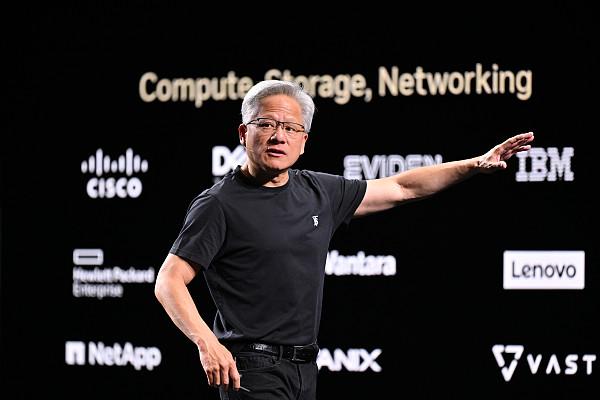
[文/观察者网 柳白]在传出下周将访华的消息之际,英伟达首席执行官(CEO)黄仁勋于当地时间7月10日率先前往白宫,与美国总统特朗普会面,但会谈具体内容尚未对外公布。英伟达发言人对此拒绝置评。
据美国消费者新闻与商业频道(CNBC)报道,此次会面正值英伟达股价10日小幅上涨,成为首家在交易日收盘时市值突破4万亿美元的公司,超越苹果和微软,达成这一具有象征意义的里程碑。
彭博社称,投资者对人工智能热潮表现出持续热情,这也带动了整个科技股板块的上涨。得益于AI需求的迅猛增长,英伟达芯片销量激增,科技巨头微软、Meta、亚马逊和谷歌母公司Alphabet预计将在下一财年投入约3500亿美元的资本支出。
10日上午,特朗普在社交媒体上称赞了英伟达的股价表现。
“自特朗普关税以来,英伟达上涨了47%。美国正从关税中获取数千亿美元收入,”特朗普在“真相社交”上发文称,“这个国家现在‘重回巅峰’。”
6月11日,黄仁勋在巴黎出席第九届VivaTech科技创业与创新博览会。 视觉中国
值得注意的是,根据英国《金融时报》的报道,在此次与特朗普会面不久后,黄仁勋计划下周再度访华。
知情人士透露,黄仁勋计划于下周三(7月16日)出席在北京举行的中国国际供应链促进博览会,期间或与中国高层领导人会面。
此外,英伟达计划最早于今年9月推出一款专为中国设计的全新人工智能芯片。
According to reports, this new chip is a modified version of the existing Blackwell RTX Pro 6000 processor by Nvidia, which will remove some of the most advanced technologies. This includes improving interconnect performance and accelerating data transmission with high bandwidth memory (HBM) and NVLink, in compliance with President Trump’s tightened export controls.
The Financial Times noted that earlier this year, the tightening of export controls by the Trump administration dealt a significant blow to Nvidia’s stock price. As Nvidia seeks to maintain its position in China, a key overseas market, amidst geopolitical turmoil, Jensen Huang is intensifying efforts to engage in more diplomatic communication with both China and the US.
Bloomberg also mentioned that Huang Jensen has openly stated that American companies need to enter the world’s largest semiconductor market—China. He himself frequently visits China. His return to China comes at a sensitive moment: as a leading company in AI chips, Nvidia is deeply embroiled in the US-China tech conflict.
Huang Jensen has called for the relaxation of technology export restrictions by the US, arguing that these measures give Chinese competitors an unfair advantage. He believes that the US’s regulatory measures have effectively excluded Nvidia from the Chinese market, which is the world’s largest chip market. Consequently, the company expects to lose up to $8 billion in sales this quarter.
During his visit to China in April, Huang Jensen emphasized that Nvidia would continue to spare no effort in optimizing products that comply with regulatory requirements and unwaveringly serve the Chinese market. On April 30th, Huang Jensen once again expressed his hope that the Trump administration could change the chip export rules, stating, “The world has fundamentally changed,” and that China is not behind in AI.
In May this year, Huang Jensen publicly stated that the US’s semiconductor export controls against China have been “a failure,” causing more harm to American companies than it does to China.
In an interview on May 19th, he described the US government’s chip restriction order against China as “costly,” resulting in a loss of $15 billion in sales. He openly stated that the idea of preventing other countries from obtaining American technology by restricting the spread of artificial intelligence technology is fundamentally flawed. If American companies do not compete in the Chinese market, then Chinese technology will spread worldwide.